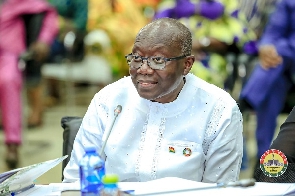 Finance Minister, Ken Ofori-Atta
Finance Minister, Ken Ofori-Atta
Embattled Finance Minister Ken Ofori-Atta has observed that the minority in parliament, who have filed a motion of censure against him on seven grounds, one of which is that he unconstitutionally withdrew money from the consolidated fund toward the construction of the national cathedral, seem confused over the processes he used in securing the funds in question.
Testifying before the ad hoc committee probing the allegations against him, Mr Ofori-Atta said: “Hon. Co-Chairs, three days ago, when the proponents were here, they alleged that I had made payments from the Contingency Fund to support the National Cathedral. I want to state that this is just not true. Let me be categorical. I have taken no money from the Contingency Fund to make payments for the National Cathedral”.
“It appears the proponents have confused the Contingency Fund with the Contingency vault”, he noted, adding: “Let me explain: there is a difference between Contingency Fund and Contingency Vault”.
He went on: “The Contingency Fund, the Proponents refer to, is what is covered under the Constitution, specifically under article 177. This constitutes money voted by Parliament and advances from this must be authorised by the Parliamentary Finance Committee. The Contingency Vote, on the other hand, is a line under the “Other Government Obligations” vote which is approved by the Finance Committee and passed as part of the annual Appropriation Acts passed by Parliament”.
“Hon. Co-Chairs, in preparing the Annual Budgets, the practice is that provision is made for indicative expenditures that have not been fully costed at the time of the Budget presentation. Provisions are made in the Contingency Vault to cater for such expenditures. For example, in 2014, there was no specific allocation in the 2014 budget for Ghana’s participation in the FIFA World Cup in Brazil. The Cabinet of President John Mahama, in March 2014, at the time, approved some $9.622 million for that tournament, including that amount which was flown to Brazil in a private jet for the players. A more current example is Ghana’s participation in Qatar. The Black Stars qualified for the 2022 FIFA World Cup, way after the 2022 budget, presented on 16 November 2021, was approved by Parliament. No specific amount was budgeted for it but through the Contingency Vote, we have been able to provide funds legitimately for the team to participate in the competition”, he noted.
Mr Ofori-Atta indicated: “Expenditures in respect of the National Cathedral were made from the Contingency Vault under the “Other Government Obligations” vote as has been the practice before my tenure (I have copies of several payments from the Contingency Vote dating back to 2015 to share). Hon. Co-Chairs, as Finance Minister, I am fully aware of the approval procedures for use of the Contingency Fund and have not breached its requirement”.
He said: “The National Cathedral is 100% owned by the State and is not the President’s Cathedral as described by the Proponents. Indeed, the Attorney General issued an opinion on 6th January 2022, that the National Cathedral is a state-owned company limited by guarantee, under the Ghana Museums and Monuments Board”.
“Hon. Co-Chairs, the policy direction and updates on the National Cathedral have been publicly presented over the years through the National Budget Statement and Economic Policy presented to Parliament. In paragraph 156 of my Budget Speech on the 2019 Budget Statement and Economic Policy, I announced on the floor of Parliament, Government’s vision for the National Cathedral as well as the commitment to facilitate the construction by providing the land, the Secretariat, and seed money. This subject was part of the policy approval of the Budget after extensive debate”.
“Subsequently, regular updates on the progress of the construction of the National Cathedral have been provided to Parliament and the nation. These include: 2020 Budget Statement and Economic Policy – Paragraph 385: which announced the establishment of the Board of Trustees and Secretariat for the Cathedral. Mid-Year Review of the 2020 Budget Statement – Paragraph 279: which provided an update on the ground-breaking ceremony held on 5th March 2020 to mark the formal commencement of the construction phase of the project. 2021 Budget Statement and Economic Policy – Paragraphs 1132 and 1134: which informed the House of the Letter of Intent (LoI) signed on 25th November 2020 between NCG Trustees and RIBADE JV (led by Rizzanni de Eccher with M Barbisotti & Sons and Desimone. And, the Appointment of Apostle Prof. Opoku-Onyinah as the new Chairman of the Board of Trustees on 8th February 2021. Mid-Year Review of the 2021 Budget Statement – Paragraphs 354 and 355: which announced the expansion of the Cathedral project to include a Bible Museum (Bible Museum of Africa – BMOA) and Biblical Garden; as well as the establishment of the 100-Cedis-a-Month “Ketewa Biara Nsua” Club, in line with the original plan to encourage as many donors as possible to contribute towards the establishment of this national monument”.
“In conclusion, Co-Chairs, all the payments made for the National Cathedral were lawfully done and from the Contingency Vote under the “Other Government Obligations” vote and not from the Contingency Fund as alleged by the Proponents”.